Ards prone position - Study guides, Class notes & Summaries
Looking for the best study guides, study notes and summaries about Ards prone position? On this page you'll find 350 study documents about Ards prone position.
Page 2 out of 350 results
Sort by
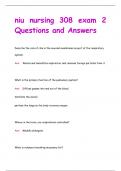
-
niu nursing 308 exam 2 Questions and Answers
- Exam (elaborations) • 25 pages • 2024
- Available in package deal
-
- $12.49
- + learn more
Describe the role of cilia in the mucosal membranes as part of the respiratory system. Ans: Warms and humidifies inspired air and removes foreign particles from it. What is the primary function of the pulmonary system? Ans: Diffuse gasses into and out of the blood. Ventilate the alveoli. perfuse the lungs so the body recieves oxygen. Where in the brain, are respirations controlled? Ans: Medulla oblongata What is volunary breathing necessary for? Ans: talking, singing, laughing, and ho...
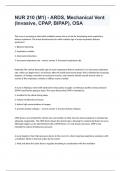
-
NUR 210 (M1) - ARDS, Mechanical Vent (Invasive, CPAP, BIPAP), OSA with complete solutions 2024
- Exam (elaborations) • 25 pages • 2024
- Available in package deal
-
- $17.99
- + learn more
NUR 210 (M1) - ARDS, Mechanical Vent (Invasive, CPAP, BIPAP), OSAThe nurse is assessing a client with multiple trauma who is at risk for developing acute respiratory distress syndrome. The nurse should assess for which earliest sign of acute respiratory distress syndrome? 1. Bilateral wheezing 2. Inspiratory crackles 3. Intercostal retractions 4. Increased respiratory rate - correct answer 4. Increased respiratory rate Rationale:The earliest detectable sign of acute respiratory distress s...
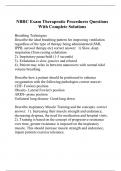
-
NBRC Exam Therapeutic Procedures Questions With Complete Solutions
- Exam (elaborations) • 22 pages • 2023
- Available in package deal
-
- $12.99
- + learn more
Breathing Techniques Describe the ideal breathing pattern for improving ventilation regardless of the type of therapy being administrated (SMI, IPPB, aerosol therapy etc) correct answer: 1) Slow, deep inspiration (from resting exhalation 2). Inspiratory pause/hold (1-3 seconds) 3). Exhalation is slow, passive and relaxed 4). Patient may relax in between maneuvers with normal tidal volume breathing Describe how a patient should be positioned to enhance oxygenation with the following pa...
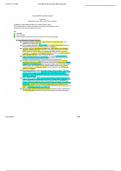
-
Advanced Med Surg (Med Surg III) Final Exam Respiratory , Neuro, Burns, and Previous Exams
- Exam (elaborations) • 55 pages • 2024
- Available in package deal
-
- $11.99
- + learn more
Advanced Med Surg (Med Surg III) Final Exam Respiratory , Neuro, Burns, and Previous Exams Key: III = Important. III = V ery Important. III = Direct answers to questions from the professor ’s previous study guides. 1. Acute Respiratory Distress Syndrome ● T reatment for ARDS: I dentification and treatment of underlying cause, need aggressive and supportive care. ● How to position the patient: Prone position (It is best for oxygenation) Reposition the patient frequent...
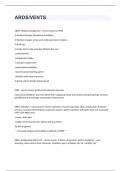
-
ARDS/VENTS questions well answered 2024
- Exam (elaborations) • 6 pages • 2024
- Available in package deal
-
- $12.99
- + learn more
ARDS/VENTSARDS: Medical Management - correct answer 1) PEEP 2) Positive Pressure Mechanical Ventilation 3) Position changes- prone and continuous lateral rotation 4) fluid mgt 5) meds- don't really work but still here they are: -corticosteroids -inhaled Nitric Oxide -surfactant replacement -partial liquid ventilation -neuromuscular blocking agents -nutrition with enteral formulas 6) giving carbon dioxide (hypercapnia) PEEP - correct answer positive end expiratory pressure mechani...
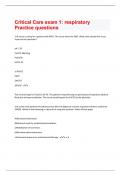
-
Critical Care exam 1: respiratory | 80 Questions and Answers Graded A+
- Exam (elaborations) • 26 pages • 2023
- Available in package deal
-
- $9.49
- + learn more
1) A nurse is caring for a patient with ARDS. The nurse views the ABG. What value should the nurse report to the physician? pH: 7.35 PaCO2: 26mmhg PaO2:95 HCO3: 22 a) PaCO2 b)pH c)HCO3 d)PaO2 - a The normal range for PaCO2 is 35-45. This patient is experiencing a superimposed respiratory alkalosis likely due to hyperventilation. The nurse should report the PaCO2 to the physician. 2) A nurse must position the patient prone after his diagnosis of acute respiratory distress syndrome (A...
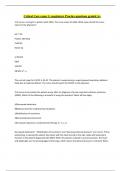
-
Critical Care exam 1: respiratory Practice questions graded A+
- Exam (elaborations) • 26 pages • 2024
- Available in package deal
-
- $10.99
- + learn more
Critical Care exam 1: respiratory Practice questions graded A+ 1) A nurse is caring for a patient with ARDS. The nurse views the ABG. What value should the nurse report to the physician? pH: 7.35 PaCO2: 26mmhg PaO2:95 HCO3: 22 a) PaCO2 b)pH c)HCO3 d)PaO2 ️a The normal range for PaCO2 is 35-45. This patient is experiencing a superimposed respiratory alkalosis likely due to hyperventilation. The nurse should report the PaCO2 to the physician. 2) A nurse must position th...
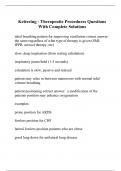
-
Kettering - Therapeutic Procedures Questions With Complete Solutions
- Exam (elaborations) • 39 pages • 2023
- Available in package deal
-
- $12.99
- + learn more
ideal breathing pattern for improving ventilation correct answer: the same regardless of what type of therapy is given (SMI, IPPB, aerosol therapy, etc) slow, deep inspiration (from resting exhalation) inspiratory pause/hold (1-3 seconds) exhalation is slow, passive and relaxed patient may relax in between maneuvers with normal tidal volume breathing patient positioning correct answer: a modification of the patients position may enhance oxygenation examples: prone po...
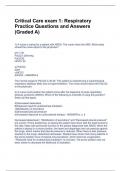
-
Critical Care exam 1: Respiratory Practice Questions and Answers (Graded A)
- Exam (elaborations) • 19 pages • 2023
- Available in package deal
-
- $11.49
- + learn more
Critical Care exam 1: Respiratory Practice Questions and Answers (Graded A)Critical Care exam 1: Respiratory Practice Questions and Answers (Graded A)Critical Care exam 1: Respiratory Practice Questions and Answers (Graded A)Critical Care exam 1: Respiratory Practice Questions and Answers (Graded A) 1) A nurse is caring for a patient with ARDS. The nurse views the ABG. What value should the nurse report to the physician? pH: 7.35 PaCO2: 26mmhg PaO2:95 HCO3: 22 a) PaCO2 b)pH c)HCO3 d...
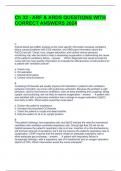
-
Ch 32 - ARF & ARDS QUESTIONS WITH CORRECT ANSWERS 2024
- Exam (elaborations) • 13 pages • 2024
- Available in package deal
-
- $19.49
- + learn more
Ch 32 - ARF & ARDS QUESTIONS WITH CORRECT ANSWERS 2024 C Arterial blood gas (ABG) analysis is the most specific information because ventilatory failure causes problems with CO2 retention, and ABGs give information about the PaCO2 and pH. Chest x-ray, oxygen saturation, and central venous pressure monitoring may also be done to help in assessing oxygenation or determining the cause of the patient's ventilatory failure. Which diagnostic test would provide the nurse with the most specific infor...

Study stress? For sellers on Stuvia, these are actually golden times. KA-CHING! Earn from your study resources too and start uploading now. Discover all about earning on Stuvia


